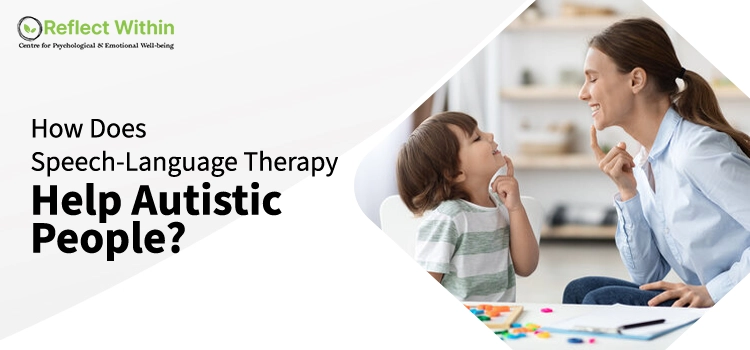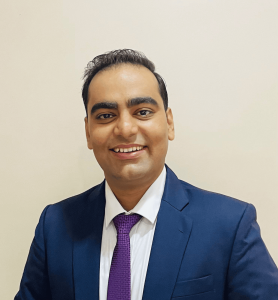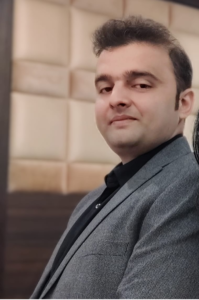Autism, also known as Autism Spectrum Disorder (ASD), is a disorder associated with a person’s developmental growth. This disorder mainly affects a person’s ability to behave, learn, or communicate with the surrounding people. Certainly, medical professionals suggest autistic people opt for speech language therapy. It’s because Autism significantly affects one’s ability to speak or communicate with others, and speech therapy can help such people. In this blog, we will discuss what speech therapy is all about and how it helps one with ASD
Understanding What is Speech Language Therapy All About
Speech therapy is an effective way of treating autistic people with prominent language and communication challenges. During this therapy session, the pathologists help sufferers improve their non-verbal, verbal communication, and the ability to socialize or interact with others. Additionally, the speech-language therapy specifically addresses the communication or speech-related challenges that vary person to person.
Certainly, people with ASD can develop different signs related to their ability to talk or communicate with others. This means that some people may love to talk but can’t hold a conversation or grasp facial or body gestures, while others may be unable to even speak properly. However, the overall objective of speech therapy is to help such people easily communicate or interact with others.
Signs of Autism Spectrum Disorder in Adults and Children
Well, the signs of autism spectrum disorder in adults and children having speech issues may vary. Below, we have specifically mentioned the most common developing signs of ASD. Have a look:
Signs of ASD in Children
- No response to their names while calling or talking about them.
- Avoid or ignore eye contact while communicating with others.
- No smile when others smile at them during any conversation or interaction.
- Repetitive movements, like flapping hands or flicking fingers during any interaction with others.
- Autistic children also avoid talking to other children.
- Frequent repetition of the same phrases or words.
- Unable to understand what others are feeling, doing, or trying to communicate.
- Unusual speech while interacting with others.
Signs of ASD in Adults
- Unable to find or understand what others are thinking or feeling.
- Getting anxious while socializing or interacting with others.
- Take idioms or phrases literally that people may say in sarcasm.
- No eye contact with others during any interaction or conversation.
- Repetitive phrases or words while communicating with others.
- Uneven language development.
So, these were the few signs of autism spectrum disorder in adults and children having speech-related issues. Now, let’s continue reading and learn more about how ASD affects one’s ability to speak.
How Does Autism Trigger Speech Disorder?
Autism can prominently trigger people with speech disorder in several ways. Some of them are explained below:
1. Repetitive or Stereotyped Speech
As noted above, repetitive or stereotyped speech is a common developing sign in people with ASD. This speech disorder includes repeating phrases or lines, scripted speech, and sometimes repetitive motor movements as well.
2. Echolalia
Echolalia includes the repeating words or phrases that autistic individuals hear, either immediately or after a delay. Well, for children under the age of 3, echolalia is normal and a way of learning communication, but if it continues during adulthood, it’s a sign of Autism that majorly triggers speech disorder.
3. Issues with Non-verbal Communication
Non-verbal communication includes gestures, body language, and facial expressions while communicating with others. However, autistic individuals often face difficulties while grasping these non-verbal expressions or gestures that majorly affect their speech and interaction ability.
4. Unusual Speech Tone or Rhythm
Have you ever noticed someone speaking with a flat, robotic voice, or in a sing-song manner? It happens when a person is suffering from autism spectrum disorder. This disorder makes autistic people lose the ability to use prosody. As a result, it makes them speak in an unusual speech rhythm or tone.
5. Delayed Language Development
Autistic children might start speaking or learning a language later than usual. These language or speech delays make it tough for the children to coordinate the jaws, tongue, or lips. The proper coordination of this entire oral cavity is essential for producing proper speech sound that eventually triggers disorder while speaking.
What Causes Speech Disorder in Autism?
Several factors can bring about speech disorders among people with Autism. Below, we have mentioned some of the common causes:
- Nutrient and vitamin deficiencies
- Dysfuncton
- Cerebral Folate Deficiency (CFD)
- Poor motor skills development
- Any head injury or brain problem
- Genetic and Environmental factors
- Sensory problems or neurological developmental issues
Role of Speech Therapy in Autism Treatment
A speech pathologist is a trained professional who works with autistic people to improve their listening, reading, speaking, communicating, and interacting abilities. Now, to understand how these pathologists work and what’s the role of speech therapy in Autism, we have some points below:
1. The therapy helps autistic people express their needs and wants through proper verbal and non-verbal communication.
2. During the autism speech therapy sessions, the pathologist also helps children and adults with ASD learn how to exchange thoughts, ideas, and emotions with others using effective communication.
3. Also, this therapy treatment teaches autistic people strategies for interacting with others and socializing.
4. Certainly, autistic people face unusual language processing and learning patterns that trigger speech difficulties. However, autism speech therapy helps such people learn how to overcome unusual patterns and develop the ability to properly functional speech.
5. Autism also affects people who struggle with the proper articulation of sounds and correctly putting words into sentences. It also includes trouble with concepts of vocabulary, language, and pronunciation. However, speech therapists can help people learn these concepts better by polishing fine-tuning skills.
What Techniques Does Speech Therapy Include to Help Autistic People?
For a quick and effective treatment, autism speech therapy pathologists must use some of the following techniques during the session to help autistic people. Moreover, these approaches depend on how severe the signs are from person to person. The techniques are:
- Mimicry of animal voices to help a child tell which is that specific animal.
- Massaging and strengthening muscles in the oral cavity, including jaw, tongue, throat, lips, and mouth, help develop and polish the ability to speak and communicate.
- A picture board activity or picture exchange communication system is used to correct sentence structure, communication, and picture discrimination.
- music therapy, as it helps people communicate better.
- Try using speech output devices.
- Setting a habit of reading story books that help children understand and think about different situations.
- Sing-a-song activities to create proper rhythm in the sentences.
- Better articulation of words with regular practice.
- Facial exercises for better pronunciation of words and understanding of what others are feeling or explaining.
Key Takeaway!
The role of speech-language therapy and professional speech-language pathologist for people with Autism Spectrum Disorder (ASD) is quite effective. Through this, children and adults with Autism get help in learning ways to better communicate and develop the ability to speak. If you’re the one or know someone who needs help from professional speech-language therapists to improve autistic signs of speech disorder, contact Reflect Within Today.


















